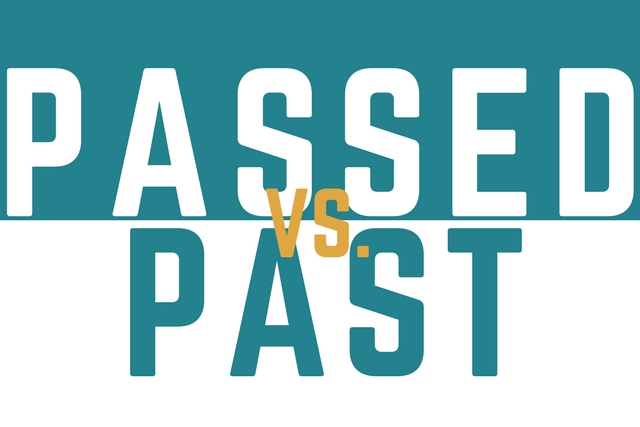Grammar Chaos: Mastering Passed and Past
Posted on Sep 06, 2017
How do you know when to properly use passed or past in a sentence? Feel free to “pass the time,” and read our short guide to these tricky rhymes!

First things first: you might have already noticed that passed and past sound very much alike. Indeed, there are some words with the same pronunciations but different meanings. You can say you’ve been to Disneyland and also say that Jack planted a magic bean in his backyard. Likewise, you can say that your shirt is brand-new and that you never knew the proper way to wash shirts. But what happens when two words not only sound alike but also often difficult to tell apart?
Let’s start with passed. This word is exactly what it looks like—the past tense and past participle of the verb pass, meaning “to move” or “to depart.” In a sentence, this can be used either transitively (with both a subject and an object) or intransitively (with a subject but no object).
Here are some examples of sentences with the word passed:
Transitive: She [subject] passed through the hallway [object] on her way to class.
Intransitive: The cars [subject] passed by on the dusty, deserted highway.
On the other hand, the word past can be used as either a noun, meaning “time that has gone by”; an adjective, meaning “elapsed”; or the adverb of the verb pass. In specific cases, past can also be used as a preposition when referring to units of time.
Here are some examples of the word past used differently in certain circumstances:
Noun: It’s all in the past, so I forgive you for your mistakes.
Adjective: You’ve been working on that painting for the past ten months.
Adverb: Several taxicabs went past him, and he still needed one to attend an urgent meeting.
Preposition: At half past three in the morning, she saw something move in the corner of her room.
Also, did you know the word pastime is a mix between the words pass and time, meaning to “pass the time” doing one’s favorite things? Think of that the next time you’re reading a good book or baking your favorite cake!
In the end, whether or not you should use passed or past in a sentence will depend on the word’s form. Remember that passed is a past-tense or past-participle verb and that past is a noun, adjective, adverb, or preposition. Keep this in mind, and your confusion will be in the past!
Need more help with writing? Check out the Grammar Chaos series on the 1-Hour Proofreading blog, giving you the handiest grammar tips every week.
Sources:
Disclaimer: Image is not ours. Credit to the owner.
About 1-Hour Proofreading
1-Hour Proofreading is a growing start-up offering fast and efficient editing services at a reasonable price, with the assurance that the document is publication-ready the soonest you need it. Its team of highly competent professional editors is committed to helping those in need of quality editing services while facing tough deadlines.
Visit 1hourproofreading.com for more details.
Follow us:
Back to Grammary



